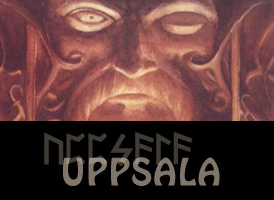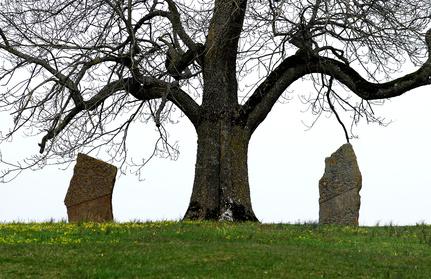
Odin
Loki
Berserkergang
Valkyries
Alfish Worship
Runes
Asatru
Factions in Asatru
Heathen
Mysticism

Alfish Worship and Personal Deities
It can be argued that worship of the alfs and other such personal or local deities was a larger part of the religious lives of ancient heathens than worship of the pantheon of gods was. There are stories from the Conversion, such as that one related by Saint Martin, that even when people were so ready to convert to Christianity that they would allow temples to the gods to be pulled down, on no account would they allow things sacred to the alfs to be touched. And many are the stories of villages that worshipped the dwarf of a nearby sacred rock (as the folk tradition of the Gubich seems to indicate), or river, or mountain. There are endless stories of farmers who struck bargains with a particular troll, dwarf, or alf for the prosperity of the farm, such as the story of Kodhran. Every household had its own particular deities, female spirits known as disir. There were many important holy days set aside for them. Even individuals had disir who followed them around and saw to their luck, and protection, and development, and eventually their deaths. That some had cultivated deep personal relationships with these personal gods is evident from or suggested by such stories as Gisli's, and Sigurd's, and Wayland's. It is evident from a whole cycle of tales about swan-maids and other alfs. Seeresses (and to a lesser extent seers) also worked primarily with such personal deities, and made a living by telling the prophecies they received from them. (There is even reason to think that seidhmen and seidhwomen had such personal deities as elements of their practices.) There were women known as Horgabrudar who practiced prophecy and healing with the alfs for centuries after the Conversion, and there were whole churches organized for alfish worship similarly far past the fall of the cults of the pantheonic gods.
In modern Asatru little attention is paid to the alfs anymore. (Please note I an using the term alf as a catch-all for alfar, landwights, huldrafolk, disir, etc.) To be sure, regular sacrifices are made to the alfs. Blots are held that are nominally for them. But in most cases they are dealt with, even still, as a sort of an afterthought. Toasts are given the gods, and then the remainder is given the alfs. Rites are held for the gods and as an addendum a sacrifice is given the alfs. And almost noone holds an alf or alfs as patron. We are Reconstuctionists. Truly reconstructing the ancient heathens' religion means giving much more thought to the alfs, to local and personal deities, than we by and large currently do. I believe the source of this error comes from a little left-over cultural contamination, as it were, from the Christians. They have for so many centuries sold their god as "the" god, the one and only deity, that they have given the word god the implication of "the largest conceivable spirit possible", rather than the more common (and certainly more heathen) "a spirit-being that has some aspect of the natural world in his or her especial care".
We know of certain signs by which one might find such alfs as local deities, signs the ancient heathens looked for. One such telltale of a local god is the botrad, or "habitation tree". This is a tree of unusual size, or that has a hole or hollow in it. Such a tree is always inhabited by an alf or alfs, who oversee the care of the land around it. Stones that have hollows in the tops are held to be the habitations of dwarfs, who are the spirits of the land for a ways around the stone. (Proper sacrifice at such a rock includes pouring alcohol into the hollow, as if it were a cup.) Other stones that are unusually large, or strange looking also might be the habitations of dwarfs. Every river, stream, crick, lake, and pond has its spirit. The largest local one was usually worshipped as the giver of life to the whole land. Every mountain was inhabited by dwarfs, kobolds, and trolls. Often the largest local mountain had a spirit that was the chiefest local deity.
Any solitary Asatruar, as well as any kindred, should get to know their local landscape. Local botrads should be found, as well as dwarf-rocks. Local history should be studied, to find any folklore associated with nearby mountains, rivers, and such things. Once a map has been formed of the local spiritual landscape the wights in question should be made offerings, by name, individually, as the pantheonic gods are. Holy days should be devoted entirely, or at least primarily, to them. And anyone in Asatru who does not feel drawn to any particular pantheonic deity as a patron should realize that the system of patronage, while undeniably a part of ancient heathen religion, was certainly not endemic. It is perfectly valid, from the Reconstructionist point of view, to blot to the pantheonic gods on those holy days when it is appropriate (such as Yule), and to be primarily concerned with local deities. Indeed, it is even quite appropriate that one be drawn to a particular local god as a patron.
Individuals, ranging from mystics to warriors to farmers, would sometimes strike up a deal with a particular alf, often the dis or fylgja attached to that same individual. (A fylgja is a spirit being that belongs to one individual.) The fylgja is that individual's personal god, a teacher and protector, and the source of that individual's luck, and other types of personal deity function in much the same manner. Such a spirit rewarded actions she or he approved of with increasing good luck, and could punish actions she did not approve of with bad luck, and even death (especially in the cases of fylgjar). This sort of religious practice, whether directed at the fylgja or at some other particular alf is a cult of the personal deity.
Such an individual religious path would vary greatly between one person and another, as each individual god would have entirely individual styles, standards, and goals. But one thing seems likely about such people who are so drawn to this particular religious path: they are most likely going to be visionaries (those with the Second Sight), mediums, and/or prophets. That is to say, people who are given to perceiving and interacting with spirits that are not part of the traditional pantheon of gods, for how else would a person find such a divinity?
Some elements would be constant to all such personal-god religious practices. One such is obviously that the spirit in question must be contacted, whether by chance, through a prophetic or medium trance, or through traditional divinatory practices such as rune-casting. Another such is that a deal must be struck for that spirit's aid. This involves finding out those practices and beliefs the spirit most approves of, for one thing, and finding out how much of them must be adopted to gain the spirit's approval for another. It also involves finding out specifically what the spirit asks and what the spirit offers in return. And most of the time it will involve doing some sort of work, performing some sort of deed, or something else that proves to the spirit that the supplicant is worth the spirit's time and effort. This all means that in the long run other devotional acts will have to be performed for the spirit (as they would for any god), and particular rites be written for blots and sumbels and such that the spirit approves of.
There are many different ways this kind of personal relationship can be cultivated with such an individually oriented god. It may take the form of a teacher-student relationship. It may be a friendship. It may be analagous to a form of employment (with either the spirit or the human as the employer). It may be like the relationship between comrades-in-arms. It may be like the relationship between a poet and some distant unattainable muse. It may be a love relationship. The spirit may simply be a counselor. And it may be combinations of various of these. Historical records, such as they are, show great variety.
Some in Asatru argue that the worship of such individual deities is a lesser thing than worship of the pantheonic deities, and so should not be taken seriously as a valid form of religion. But I think such arguments are missing a critical point of view. While the traditional pantheonic gods are "larger", more powerful, and maybe even more knowledgeable, they are also more distant, more removed, and have more demands on their attention. What is lost in sheer power is made up for in direct one-on-one interaction. I do not think those who follow a god personal to them in any way lack anything that those with a more pantheonic bent have.